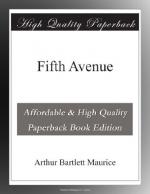Another great day on the Avenue was August 28, 1896, which witnessed the arrival of the famous Chinese statesman, Li Hung Chang. He came as a special envoy of the Chinese Emperor and stayed at the Waldorf, then a comparatively new hotel. President Cleveland sent General Thomas H. Ruger to welcome the visitor. In his cabin on the “St. Louis” in the Bay Li Hung Chang received the welcoming delegation. The author of “Fifth Avenue Events” thus describes the great Chinaman on that occasion: “His appearance was most striking. Over six feet tall, with a slight stoop, he wore the bright yellow jacket denoting his high rank, a viceroy’s cap with a four-eyed peacock feather attached to it by amber fastenings, and a beautifully coloured skirt of rich material. His finger-nails were polished till they shone, a huge diamond flashed on his right hand, and he peered out benignantly over the tops of a pair of gold-bowed spectacles. Dignified in bearing, he looked every inch the statesman and scholar. His gracious manner won him friends during his stay in New York, and his indefatigable propensity for asking questions—some of them rather embarrassing to those questioned, as when he politely inquired the ages of the ladies whom he met and the salaries of the officials who entertained him—aroused much merriment.”
In the way of a distinguished visitor Li Hung Chang was a novelty. New York gave him a rousing reception. The Avenue was lined by cheering throngs as the Ambassador and his suite were driven to the hotel. The carriages were flanked by U.S. Cavalry. Over the gaily decorated Waldorf the golden imperial banner of the Celestial Kingdom with the great blue Dragon snapping at a crimson ball fluttered in the breeze. But Li Hung Chang did not pay the hostelry the compliment of relying on its cuisine, preferring the services of his own Chinese cooks. The day after his arrival the Ambassador was received by President Cleveland at the home of ex-Secretary of the Navy William C. Whitney, Fifth Avenue and Fifty-seventh Street. Surrounding the President were the Secretaries of State, War, the Treasury, the Attorney-General, and other officials. The visiting statesman was presented to Mr. Cleveland by Richard Olney, Secretary of State, and to the Chief Executive turned over his credentials from the Chinese Emperor.
The banquet that evening, given by former American diplomats to the Celestial Empire, began at six o’clock, as Li wished to set for the Western world the example of early retiring. In his attentions to the splendid repast before him he was most abstemious, but he finished by smoking a cigar. John E. Ward, a former Minister to China, began the speech-making by a toast to the Emperor, the President of the United States, and Li Hung Chang. George F. Seward, another former Minister to China, lauded the Ambassador’s long and distinguished services to his country and to the world at large. After a brief response through his interpreter, Li left the banquet hall at eight-thirty, and went to his night’s rest. His hosts, however, were not to be balked of their evening’s entertainment, and the oratorical feast was continued till midnight.




